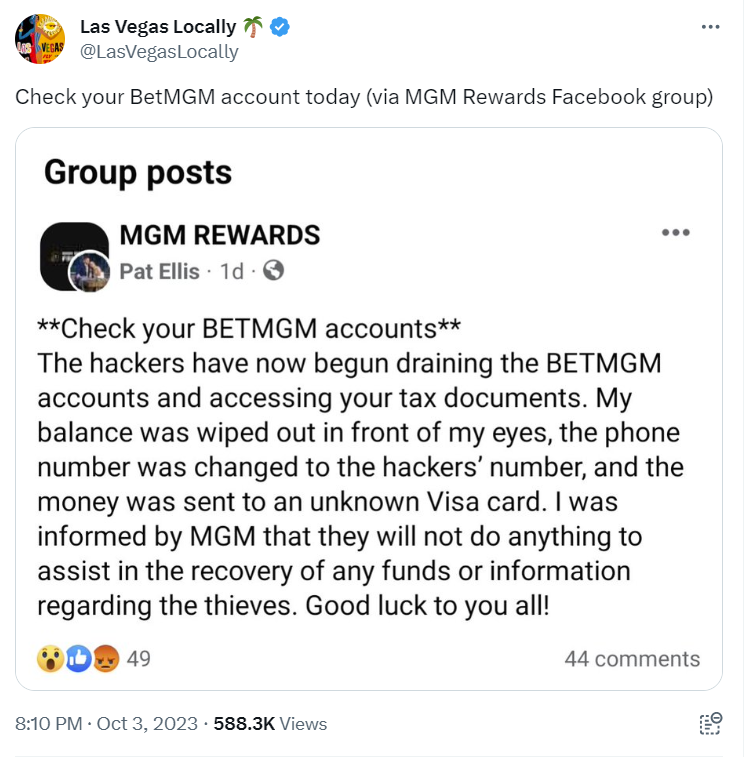One-Stop Shop
In an industry known for blockbuster multi-billion-dollar M&A deals, sometimes the smaller ones, like yesterday's announced merger of Odds On Compliance and U.S. Integrity, are the most important.
The Bulletin Board
NEWS: Odds On Compliance and U.S. Integrity merge to form “the industry’s first global compliance and integrity solution.”
NEWS: Why doesn’t Connecticut have online poker?
NEWS: the NCAA wants sports betting laws updated to protect student-athletes.
VIEWS: Will the Circa Sports model catch on in the US?
AROUND the WATERCOOLER: BetMGM accounts hit by credential-stuffing attacks.
STRAY THOUGHTS: The complexity of tribal gaming.
SPONSOR’S MESSAGE - Underdog: the most innovative company in sports gaming.
At Underdog we use our own tech stack to create the industry’s most popular games, designing products specifically for the American sports fan.
Join us as we build the future of sports gaming.
Visit: https://underdogfantasy.com/careers
Integrity and Compliance Under One Roof
I don’t often cover M&A stories, but I felt this was worthwhile. Odds On Compliance and U.S. Integrity have merged to create what it is calling “a one-stop shop of cutting-edge regulatory technology solutions and unmatched compliance expertise to the fast-evolving world of sports betting and gaming.”
The two companies had a preexisting relationship for ProhiBet. This increasingly popular tool allows organizations to monitor prohibited bettors (athletes, coaches, refs) to ensure compliance with state regulations and organizational policies.
More tools like ProhiBet that can solve actual problems are exactly what the space needs, particularly in the wake of the college and NFL betting violations.
Both companies fall into the vendor category, a critical but often overlooked part of the sports betting and online gambling industry. While everyone is focused on the operators and the tech platforms, vendors like Odds On Compliance, U.S. Integrity, GeoComply, Sightline Payments, PaySafe, GLI, and a slew of others make sure the machine runs smoothly.
The infrastructure to process payments, perform ID and geolocation checks, comply with state regulations, and certify game integrity doesn’t exist without these companies.
In the past, I’ve taken deep dives into the role of vendors for anyone interested:
Know Your Customer: The Backbone Of Legal Online Gambling In The USA
Geolocation: The Backbone Of Legal Online Gambling In The USA
Legislative Fix Needed For CT Online Poker
Connecticut legalized online gambling back in May 2021, and while its online casinos went live in October 2021, the two tribes licensed to offer online gambling have yet to launch online poker sites.
According to Mashantucket Pequot Chairman Rodney Butler, online poker is on the tribe’s radar. Still, it needs to figure out how to make an interstate agreement work first, which will require a legislative fix, as the state didn’t include interstate agreements in its original law.
“It’s coming eventually,” Butler told Play USA. The issue with online poker in every market is liquidity. If you don’t have a large enough pool, it’s not as successful. And so we haven’t gone down the path of trying to identify how we do those multistate agreements and the like that would build enough liquidity for it to be worthwhile for the players and for us.”
Foxwoods could overperform in the online poker space, as it is a popular East Coast poker destination and was one of the largest poker rooms in the world during the Poker Boom.
Sponsorship opportunity
Want to sponsor the fastest-growing newsletter in the gambling space? Straight to the Point has multiple sponsorship opportunities available.
Reach out to Steve at iGamingPundit.com for more details.
The NCAA Wants a Seat at the Sports Betting Table
The NCAA wants a say on sports betting regulations.
“The NCAA is making changes to help student-athletes make smart choices when it comes to sports betting, but given the explosive growth of this new industry, we are eager to partner with lawmakers, regulators, and industry leaders to protect student-athletes from harassment and threats,” NCAA President Charlie Baker said in a release.
Baker pointed to the inconsistent policies in place, which are anything but consistent from state to state, saying, “Some states have great policies on the books to protect student-athletes from harassment and coercion and to protect the integrity of the games, but as more states pass or amend laws, more needs to be done.”
The NCAA laid out a three-pronged approach:
Preventing harassment and coercive behavior.
Identification of prohibited bettors and preventing anyone under 21 from betting.
Advocating for problem gambling treatment.
According to the press release, each policy the NCAA will advocate for is in place in at least one state. Some specific policies are easy lifts and are already the norm in many locales. Others are bigger asks:
Mandatory reporting hotlines with a direct line to law enforcement.
Requiring information about the hotline, problem gambling, and harassment penalties in all sports betting advertisements.
Stiffer penalties for harassment of student-athletes.
Mandatory education for operators to help identify harassment.
Regulations identifying prohibited bettors.
Prohibiting anyone under 21 from wagering on sports.
Earmarking sports wagering revenue for educating students and student-athletes.
One of the better comments on the NCAA’s new approach came from Dustin Gouker, who tweeted, “The NCAA (and the pro sports leagues) were woefully unprepared for the wave of legalization and never hedged against the fall of PASPA. The below is, of course, a worthy goal, but it’s also a problem of their own making.”
Gouker also criticized the NCAA and professional sports leagues for not taking a more common-sense approach in the immediate aftermath of the PASPA repeal.
“The leagues and NCAA wishing for a federal solution off the bat, and the NCAA proposing college betting bans, both displaced common-sense/practical advocacy early on.”
Sponsor’s Message - Jackpocket, America’s #1 lottery app, is proud to partner with Spectrum Gaming Group to release “The Future of Lottery Courier Services,” a report outlining consensus-driven best practices for the industry. Implementing these common-sense measures will help ensure transparency, accountability, and consumer protection, while continuing to sustainably grow the US lottery market without compromising its integrity.
Read the report here: https://blog.jackpocket.com/spectrum-gaming-report-on-the-future-of-lottery-courier-services/
The Circa Way Is Coming to Illinois and Kentucky
Circa Sports is launching in Illinois and Kentucky, as a recent Las Vegas Independent article confirmed.
In Kentucky, Circa plans to launch mobile sports betting through a casino attached to the Cumberland Harness Racing Track in the coming months,” LVI reported following an interview with Circa’s Derek Stevens.
Why does this matter? Like Prime Sports, Circa is a sports-betting-first company.
As Stevens told the Las Vegas Independent, “Sports betting can’t be like your eighth or ninth priority,” he added. “It has to be a top priority for your business because this is an intensely competitive landscape.”
That focus (on what you do well) is something I often bring up, and it has been true for most of online poker’s existence. Looking back, being poker-first helped propel PokerStars and Full Tilt Poker ahead of its more well-rounded peers. There are other factors to be sure, but it’s a big reason why GG Poker is now the top dog.
As described by Circa director of operations Jeffrey Benson in a thread on X, the Circa mentality is, “Why would we want to give a $100 chintzy free bet when we can just offer you better prices on almost every wager you’ll make?”
“Sportsbook bonuses/free bets offer players some money upfront in return for what they give up tenfold by hanging worse prices than the competition,” Benson continued. “Whereas a bettor keeps much more money long term than what a bonus pays through the accumulation of so many better-priced wagers.”
Benson also contrasted the hold at Circa with DraftKings, noting Circa’s theoretical hold for a random baseball game on the ML is 2.22% and on the RL is 3.08%. Per Benson, at DraftKings, the theoretical hold on the ML is 4.16% and 4.09% on the RL.
Around the Watercooler
Social media conversations, rumors, and gossip.
These are unconfirmed but alarming reports. From Robert Linehan and Bonus.com.
And originally from Las Vegas Locally.
According to Todd Witteles, this may or may not be (wholly) hack-related.
But as Bonus.com reported, even though MGM and betMGM are separate entities, “Since BetMGM users are automatically enrolled in MGM Rewards, a list of emails for MGM Rewards members would include those of BetMGM users. Anyone using the same password for both might be at particular risk if the hackers managed to download and crack the encryption on any passwords.”
Stray Thoughts
In a recent conversation about sports betting, three states kept coming up: Oklahoma, Texas, and California. It immediately dawned on me that the common thread is a lack of commercial casinos.
Don’t get that confused as a knock on tribes. Instead, it demonstrates (at least to me) how difficult it is for tribes to work with the state compared to commercial operators.









